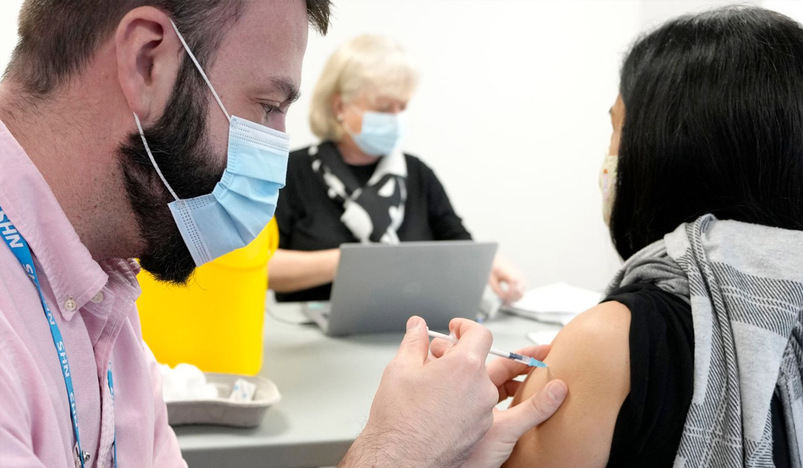
A vaccinator gives a Pfizer COVID-19 jab in London. Pic: AP
Three shots of the Pfizer/BioNTech COVID-19 vaccine has been shown to generate a neutralising effect against the new Omicron variant in a laboratory test.
The vaccine manufacturers released their first joint statement regarding the likely efficacy of their shot against Omicron on Wednesday.
They claimed that two vaccine doses resulted in significantly lower neutralising antibodies, but that a third dose increased the neutralising antibodies by a factor of 25.
If needed, they can deliver a vaccine specifically for the Omicron strain by March 2022, they added.
The research found that blood obtained from people that had their third booster shot a month ago neutralised the Omicron variant about as effectively as blood after two doses fought off the original virus - which was first identified in China.
"Although two doses of the vaccine may still offer protection against severe disease caused by the Omicron strain, it's clear from these preliminary data that protection is improved with a third dose of our vaccine," said Pfizer chief executive Albert Bourla.
"Ensuring as many people as possible are fully vaccinated with the first two dose series and a booster remains the best course of action to prevent the spread of COVID-19."
BioNTech boss Ugur Sahin added that the latest data indicates that a third dose "could still offer a sufficient level of protection from disease of any severity caused by the Omicron variant".
He continued: "Broad vaccination and booster campaigns around the world could help us to better protect people everywhere and to get through the winter season. We continue to work on an adapted vaccine which, we believe, will help to induce a high level of protection against Omicron-induced COVID-19 disease as well as a prolonged protection compared to the current vaccine."
Omicron concerns
The Omicron strain was first detected in southern Africa last month, triggering alarms around the world of another surge in infections.
More than two dozen countries from Japan to the US have reported cases.
Last month, the World Health Organisation (WHO) classified Omicron as a "variant of concern," but said there was no evidence to support the need for new vaccines specifically designed to tackle it, despite its many mutations.
The new strain also sparked fears that existing COVID-19 vaccines and treatment could be less effective against it.
The latest findings from Pfizer-BioNTech are broadly in line with a preliminary study published by researchers South Africa's National Institute for Communicable Diseases this week, which suggested Omicron was able to evade some immunity, but existing vaccines should still protect against severe disease and death.
Source: Sky News
.jpg)
Qatar Secures Place Among the World's Top 10 Wealthiest Nations
.jpg)
Hamad International Airport Witnesses Record Increase in Passenger Traffic

Saudi Arabia: Any visa holder can now perform Umrah

What are Qatar's Labour Laws on Annual Leave?
Leave a comment